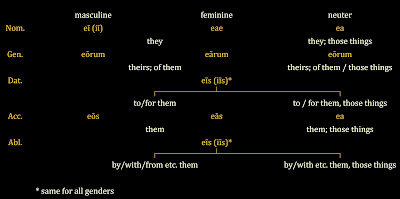[E] THE FATE OF ARTAYCTES
This is a short extract (the translation is at the end of the post), but it contains three features to note at this level of reading:
[1] the use of syncopated verb forms: extulēre; pūniērunt
[2] the way in which a single perfect passive participle can be used in Latin whereas a translation may need to expand on the idea; alligātum
[3] the future active imperative: interficitō
Nē hōc quidem modō Xanthippō, Athēniēnsium dūcī, suādēre potuit: īnstābant enim Elaeuntīnī dīcentēs: "Interficitō Artaycten;" et interficere eum volēbat ipse Xanthippus. Itaque crucī alligātum sublīmem extulēre; et fīlius eius ante oculōs lapidibus oppressus periit. Tālī modō Prōtesilāī dīrae ultrīcēs Artaycten pūniērunt.
Vocabulary and notes
īnstō, -āre, īnstitī [1]: (here) urge, insist; the imperfect tense could translate here as “they kept on [doing]”
Elaeuntīnī: the men of Elaeus
opprimō, -ere, oppressī, oppressus [3]: press down; (here) overwhelm
sublīmis, -e: (here) raised, lifted up
dīrus, -a, -um: fearful; ominous; dire
> dīrae, -ārum [1/f/pl]: fearful things; portents; unlucky signs
ultrīx, ultrīcis: avenging; the word can also be a noun i.e. ultrīx, ultrīcis [3/f]: avenger; punisher (female), the male equivalent being ultor, ultōris [3/m]
[1] Itaque crucī alligātum sublīmem extulēre │ And so they lashed him to a cross ¦ and raised him up on high
efferō (ecferō), effere, extulī, ēlātus: (here) lift up
extulēre = extulērunt; this is a feature with which you need to become familiar when reading the authors. It is known as a syncopated verb form which means that one or more sounds are omitted from a verb; the term ‘contraction’ is also used. It is often seen (as in this extract) in the 3rd person plural of perfect tense verbs where -ērunt is written as -ēre:
laudāvērunt > laudāvēre
mansērunt > mansēre
dūxērunt > dūxēre
fēcērunt > fēcēre
The final verb of the extract is also syncopated:
pūniērunt = pūnivērunt i.e. loss of -v- in perfect tense forms
More information on syncopated verb forms is given here:
https://adckl.blogspot.com/2025/04/130725-level-3-labours-of-hercules-viii.html
[2] Note the single perfect passive participle alligātum:
Itaque crucī alligātum sublīmem extulēre
Lierally: and so they raised ¦ [him] (who had been / having been) lashed to a cross ¦ up high
i.e. the participle neatly conveys the entire idea but, in translation, two clauses would render the sentence more fluently, still showing that one action happened before the other: And so they lashed him to a cross ¦ and raised him up on high.
[3] interficitō: an example of the future active imperative
In a sense, the term ‘future active imperative’ is a misnomer since, by its very nature, a command has not yet happened and, therefore, must happen in the future. However, the idea behind this imperative is reference to an action to be done distinctly in the future as opposed to, for example, dā mihi pecūniam │ give me the money, where the command is referring to now. Equally, the future active imperative can refer to something in general that should always be done. The key point is that neither action is immediately fulfilled. English has no equivalent of these imperatives, but it can convey a difference: “Send him that message” (now), as opposed to “Make sure you get that message sent” (at some point).
Although ‘interficitō Artaycten’ literally says ‘kill Artayctes”, Artayctes is not physically present i.e. the instruction is not to kill him immediately. Therefore, a translation such as “You must / you’ll have to kill Artayctes” would convey the idea more precisely.
The distinctive endings to look out for are:
[i] 2nd / 3rd person singular: -tō
[ii] 2nd person plural: -tōte
[iii] 3rd person plural: -ntō
dō, dāre [1]: give; sum, esse: be
[i] datō; estō
[ii] datōte; estōte
[iii] dantō; suntō
Examples from the authors:
[i]
At ob eam rem līber estō (Plautus) │ But by way of return for this matter, be a free man.
Crās petītō; dabitur. (Plautus) │ Ask tomorrow; it shall be given.
Lībum hōc modō facitō. (Cato) │ Make the pancake in this way
The example above well illustrates the future imperative referring to a generalised statement with no suggestion that somebody is being commanded to do it now, not unlike a modern recipe book where instructions are given as to how you will always prepare that food. Cato’s work Dē agrī cultūrā shows many examples of the future active imperative which convey that sense. Here are a few from one small section:
Vīcīnī quō pactō niteant, id animum advertitō │ Notice how the neighbours keep up their places
Frondem īligneam legitō │ Gather oak leaves
Circum oleās autumnitāte ablaqueātō et stercus additō. │ During the autumn dig trenches around the olive trees and add manure
Frondem pōpulneam, ulmeam, querneam caeditō per tempus │ Cut poplar, elm, and oak leaves at times
Post imbrem autumnum rapīnam, pābulum lupīnumque seritō. │ Sow turnips … after the autumn rains.
Hominī mortuō nē ossa legitō quō post fūnus faciat (Cicero) │ The bones of the deceased shall not be collected for the purpose of giving him a subsequent funeral
The verbs scīre (know), habēre (have, and in the sense of ‘consider’) and meminī (remember) regularly use the future active imperative:
Sed ūnum hoc scītō (Plautus) │ But know / understand this one thing
Fīliolō mē auctum scītō (Cicero) │ Learn that I am blessed with a little boy.
Sīc in animō habētō (Cato) │ Keep (have) in mind these points
Bovēs maximā dīligentiā cūrātōs habētō (Cato) │ Keep / have the oxen looked after [ = See that the oxen are looked after] with the greatest care
Sīc habētō, mī Tirō (Cicero) │ Understand (consider) it in this way, my Tiro
Mementō ergō dīmidium istinc mihi dē praedā dare (Plautus) │ Therefore, remember to give me one half of that plunder.
Dē pallā mementō, amābō (Plautus) │ Remember about the gown, there’s a dear!
[ii] Addressing more than one person; note the way in which the characters are referring to future events:
Bonam dedistis, advocātī, operam mihi. crās manē, quaesō, in comitiō estōte obviam (Plautus) │ Assistants, you have lent me your good services. To-morrow morning I beg you'll meet me at the court of justice [ = literally: be in the way].
Cēterum quantum lubet mē poscitōte aurum: ego dabō. (Plautus) │ As for the rest, ask of me as much gold as you please; I'll find it for you.
Invadam … oppidum anticum et vetus: … geritōte amīcīs vostrīs aurum corbibus (Plautus) │ I’ll attack the old town and the new one: … then carry to your friends the gold in baskets (note the translator’s use of the little word ‘then’ to refer to action that will happen after something else is done i.e. no suggestion of the present)
Mementōte illud, advocātī (Plautus) │ Remember that, assistants
[iii] One extensive extract from Cicero’s Dē lēgibus shows many examples of the 3rd person plural of the future imperative. Although English uses a future tense in the translations, Cicero is giving general instructions as to what must be done – and always done:
The roles of the Censors
urbis templa … tuentō │ They shall have charge of the temples … within the city
populīque partīs in tribūs dīscrībuntō │ They shall make a division of the citizens into tribes
equitum peditumque prōlem dēscrībuntō │ They shall enrol the recruits for the cavalry and infantry
caelibēs esse prohibentō │ They shall prohibit celibacy
mōrēs populī reguntō │ They shall regulate the morals of the people
probrum in senātū nē relinquontō │ They shall allow no one guilty of dishonourable conduct to remain in the Senate [ = they shall not leave a disgraceful person in the Senate]
bīnī suntō │ They shall be two in number
magistrātum quīnquennium habentō │ They shall hold office for five years
____________________
[E] Not even in this way was he able to persuade Xanthippus, the general of the Athenians; for the men of Elaeus kept urging him, saying, ‘You must slay Artayctes’; and Xanthippus himself desired to kill him. And so they lashed him to a cross and raised him up on high; and his son perished before his eyes, overwhelmed with stones. In such a manner as this the avenging curses [dīrae ultrīcēs]of Protesilaus punished Artayctes.













